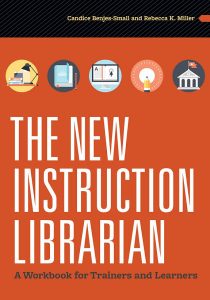I recently had the opportunity to experience my first professional academic librarian interview. It was quite an experience!
Six months before graduation, I applied to a handful of positions, ranging from a few part-time to adjunct positions to first year and user experience librarian positions. I printed out job descriptions, and highlighted the skills that showed up frequently, since this indicated the importance of those skills for the position. Additionally, I even checked to see if I used any of the highlighted skills and words appropriately in my resume. I made sure to thoroughly read through and explore each school’s website to get familiar with the institution.
After getting a couple of rejection and not hearing back from some schools, I received an e-mail for an initial interview for an interdisciplinary studies librarian position. After some excitement, I realized that even if nothing happened, at least I would get some interview experience. Immediately, I began to utilize many career resources provided by SU.
The next step was key to my preparation process and success. I recorded myself on my laptop, then repeated this step until I could speak confidently and calmly. I watched the perfected recording multiple times to embody the best interview version of myself.
The Second Interview
Things got real for me when I received an email for a second interview. I was more nervous than excited the second time around. I received the schedule for the second interview and it was long. It entailed a campus tour and dinner the evening before the actual interview which lasted from 9:00 a.m. to 5:00 p.m. with a required library workshop the following day. I had about three weeks to prepare for it. This time, I reached out to friends and colleagues for feedback and support. It made all the difference than if I just did it alone.
Fortunately, taking IST 662 (Instructional Strategies and Techniques for Information Professionals) during the entire interview process helped to build my confidence in my library instruction skills. Brushing up on the ACRL’s frameworks and using them in my workshop with a breakout activity also helped to demonstrate skills that were listed in the job description.
I did make a mistake during my workshop, but I caught it in time to explain what I did wrong. I was able to discuss what I would improve in my workshop in the future. The interview progressed with various meetings by the hour with other librarians and library staff. I was exhausted but quite satisfied by the end of the interview.
Tips for current library students and graduates
- Keep a career journal. This has been my best method for keeping track of my growth as a librarian. It’s been useful to write and reflect about classes I have taken, what I found to be my strengths, what areas I have for further improvements. Always write down your accomplishments no matter how small. It feels so good to go back to them and say ‘yes, my efforts are not for granted.’
- Search for librarian jobs well before graduation. It will help to look up job description on positions you are interested in to get familiar with the vocabulary and skills. Underline words, skills, software, and organizations you are not familiar and look them up. If you are able, try to work as support staff in an academic library to gain experience.
- Build a personal website. It doesn’t have to be anything fancy. The job I applied for had an option for me to attach my website where I had samples of some of my assignments, my librarian pitch, and vision. Something as simple as that can help you stand out and further supplement what you have written on your resume.
- Reach out. Burn out is something to take into consideration. Have a support network to keep you uplifted and do ask for help from professors.
- Ask questions. Don’t be afraid to ask questions to the search committee about interview format and details if they don’t provide that information beforehand.

Screenshot of personal website. Photo courtesy of Nazia Ahlam.
Some books & resources I used
Benjes-Small, C. M., & Miller, R. K. (2017). The new instruction librarian: A workbook for trainers and learners. Chicago: ALA Editions, an imprint of the American Library Association.
Chou, R. L., & Pho, A. (2018). Pushing the margins: Women of color and intersectionality in LIS. Sacramento, CA: Library Juice Press.
https://syracuse.biginterview.com/
Lynda.com Managing Your Early Career

A copy of the New Instruction Librarian.
by Nazia Islam
